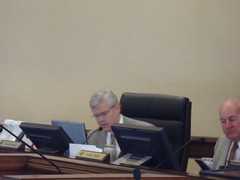Updates 9 Dec 2012: Marked with *.
Will the Lowndes County Commission Tuesday evening
finish railroading through their non-solution to solid waste disposal,
 without shouldering its legal responsibility to protect
the environment and the public health, safety, and well-being from solid waste,
and what’s this about a vendor change?
Will the Chairman once again invite a developer to speak in Monday morning’s
Work Session without letting anyone else speak?
Will the Commission change the zoning code and rezone inside and against
the Moody Exclusion Zone for that same developer they already
provided $130,000 in road construction labor to back in 2007?
Does Naylor need the area’s nineteenth Dollar General, and who’s behind it, anyway?
How come the Five Points library is still on the agenda even though SPLOST VII failed?
And what are they doing to the Alcoholic Beverage Ordinance this time?
Come Monday morning at 8:30 AM and Tuesday evening at 5:30 PM and see!
Better yet, also call or write your Commissioner before then.
without shouldering its legal responsibility to protect
the environment and the public health, safety, and well-being from solid waste,
and what’s this about a vendor change?
Will the Chairman once again invite a developer to speak in Monday morning’s
Work Session without letting anyone else speak?
Will the Commission change the zoning code and rezone inside and against
the Moody Exclusion Zone for that same developer they already
provided $130,000 in road construction labor to back in 2007?
Does Naylor need the area’s nineteenth Dollar General, and who’s behind it, anyway?
How come the Five Points library is still on the agenda even though SPLOST VII failed?
And what are they doing to the Alcoholic Beverage Ordinance this time?
Come Monday morning at 8:30 AM and Tuesday evening at 5:30 PM and see!
Better yet, also call or write your Commissioner before then.
Trash
6.b. Solid Waste Ordinance
Will the Commissioners finish
railroading through their
 already-failing non-solution to solid waste disposal
in the last session of this Chairman?
The plan for which they held
zero public hearings while any of
the Commissioners who voted on it this October were on the Commission,
yet someone down there feels free to
anonymously ridicule concerns about that plan failing?
Two citizens
spoke up anyway,
even though
Citizens Wishing to Be Heard
was after the scheduled vote last time,
and
another on this blog,
all willing to state their names, unlike the anonymous pro-trash-railroad
ridiculer.
What was that
unspecified new information
that caused them to table it last time, anyway?
already-failing non-solution to solid waste disposal
in the last session of this Chairman?
The plan for which they held
zero public hearings while any of
the Commissioners who voted on it this October were on the Commission,
yet someone down there feels free to
anonymously ridicule concerns about that plan failing?
Two citizens
spoke up anyway,
even though
Citizens Wishing to Be Heard
was after the scheduled vote last time,
and
another on this blog,
all willing to state their names, unlike the anonymous pro-trash-railroad
ridiculer.
What was that
unspecified new information
that caused them to table it last time, anyway?
8.b. Exclusive Franchise Agreement for Residential Solid Waste Collection Services with Advanced Disposal Services of Central Alabama, Inc.
What happened to Veolia; Continue reading











